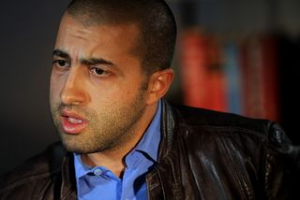 Mosab Hassan Yousef is the son of sheik Hassan Yousef, a co-founder of the Palestinian terrorist group Hamas. Raised a Muslim in Israel’s West Bank, he developed increasing animosity toward Jews until he went to jail at age 18 for buying weapons to war against Israel. In custody, however, he agreed to spy within Hamas for the Israeli intelligence organization Shin Bet. For the next decade, he provided inside information that helped prevent numerous terrorist attacks. As he helped Israel, he also explored the Christian faith and eventually committed his life to Jesus as Savior and Lord.
Mosab Hassan Yousef is the son of sheik Hassan Yousef, a co-founder of the Palestinian terrorist group Hamas. Raised a Muslim in Israel’s West Bank, he developed increasing animosity toward Jews until he went to jail at age 18 for buying weapons to war against Israel. In custody, however, he agreed to spy within Hamas for the Israeli intelligence organization Shin Bet. For the next decade, he provided inside information that helped prevent numerous terrorist attacks. As he helped Israel, he also explored the Christian faith and eventually committed his life to Jesus as Savior and Lord.
This selection, taken from his 2010 book, Son of Hamas, recounts Yousef’s feelings when he read the New Testament for the first time. In contrast to the fierce god of Islam, he discovered a warm, humble, personal Savior who spoke to the very areas where Islam left him feeling empty.
I began at the beginning, and when I got to the Sermon on the Mount, I thought, Wow, this guy Jesus is really impressive! Everything he says is beautiful. I couldn’t put the book down. Every verse seemed to touch a deep wound in my life. It was a very simple message, but somehow it had the power to heal my soul and give me hope…
Jesus said, “Do not judge, or you too will be judged” (Matthew 7:1). What a difference between him and Allah! Islam’s god was very judgmental, and Arab society followed Allah’s lead.
Jesus rebuked the hypocrisy of the scribes and Pharisees, and I thought of my uncle. I remembered a time when he received an invitation to attend a special event and how angry he had been that he was not given the best seat. It was as though Jesus was talking to Ibrahim [his uncle] and every sheikh and imam in Islam.
Everything Jesus said on the pages of this book made perfect sense to me. Overwhelmed, I started to cry.1
——————————————————-
The Difference between Allah and Jesus—Mosab Hassan Yousef (1978 – )
1 Mosab Hassan Yousef, Son of Hamas: A Gripping Account of Terror, Betrayal, Political Intrigue, and Unthinkable Choices (Carol Stream, IL: Tyndale, 2010), 122-123.